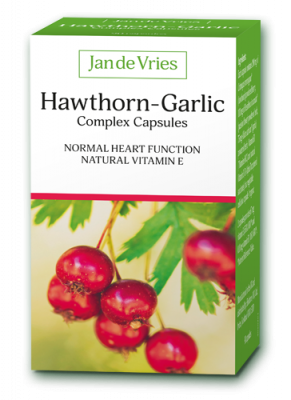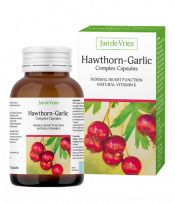What is high blood pressure and how do I know I have it?
You are considered to have high blood pressure if your blood pressure reading is above 140/90. Contrary to what many people believe, high blood pressure is not necessarily associated with symptoms; in fact it is also known as the ‘silent killer’ because so many people are unaware that they have the condition in the first place.
The best way to know if you have high blood pressure is to get a doctor to take a measurement. That way they will be able to advise you on whether or not you should take blood pressure medication, make lifestyle alterations or do both. However, you don't need to take dramatic steps to lower your blood pressure - listed below are 7 easy lifestyle changes that you can make at home.

My Top Tip: Jan de Vries Hawthorn-Garlic Complex is traditionally used to support blood pressure and circulation. Vitamin B1 contributes to the normal function of the heart while vitamin E is an antioxidant. Jan de Vries Hawthorn-Garlic Complex is traditionally used to support blood pressure and circulation. Vitamin B1 contributes to the normal function of the heart while vitamin E is an antioxidant.
|
1. Exercise regularly
Regular physical activity makes your heart stronger, meaning that it will pump blood through the body with less effort. If your heart doesn’t need to pump as hard to circulate the blood, the force on your arteries decreases, thus lowering your blood pressure.
Exercising also helps you to lose excess fat and maintain a healthy weight, which is another important factor concerning high blood pressure. If you’re not sure where to start or which exercise is right for you why not take our Get Active quiz for some ideas?
And if exercising or going to the gym is really not your thing, don’t worry! Any physical activity that increases your heart rate will have beneficial effects; this can include climbing stairs, brisk walking and even cutting the grass with a lawnmower.
2. Reduce stress
When we are stressed our body produces a surge of hormones that temporarily increase our blood pressure and cholesterol levels. Adrenaline causes your heart to beat faster and your blood vessels to narrow. One study found that although stress does not directly cause high blood pressure it can impact the development of the condition.3
Incorporate relaxation time into your daily routine; walking outside, breathing techniques, meditation, and yoga are all proven methods to help you relax. Herbal remedies containing valerian, such as our own Stress Relief Daytime, can help to soothe the nervous system and combat stress.

3. Eat a healthy diet that is low in fat and salt
You don’t have to make dramatic changes to your eating habits - even small diet alterations can make a huge impact on lowering your blood pressure! Eating a healthy diet that is rich in whole grains, vegetables and low-fat dairy products will help you keep your blood pressure balanced. Read the label on the packaging when you do your weekly food shop and opt for low-salt, low-fat alternatives.
If you can, always opt for natural and organically grown foods as these have less processing and often little or no salt. The effect of salt on blood pressure varies from person to person but, generally speaking, we should aim to consume less than 2,300 mg of salt a day. However, this can be considerably less if you have greater sodium sensitivity. If you are a great salt lover don’t try to go cold turkey – gradually reduce the amount you consume and your palate will soon adjust.
4. Help your heart with herbs
 You can also use herbs to naturally support your heart function. Jan de Vries Hawthorn-Garlic Complex, for example, has been traditionally used to balance blood pressure. It helps to gently tone the heart tissue and improves flow of oxygen to the heart, and can be used long term to help with either high or low blood pressure.
You can also use herbs to naturally support your heart function. Jan de Vries Hawthorn-Garlic Complex, for example, has been traditionally used to balance blood pressure. It helps to gently tone the heart tissue and improves flow of oxygen to the heart, and can be used long term to help with either high or low blood pressure.
Hawthorn contains flavonoids which are important for circulation and work to improve blood flow, while garlic has been found to be effective in helping to reduce high blood pressure and improving arterial stiffness and inflammation.4
Talk to your doctor if you are considering taking Hawthorn Garlic Complex alongside other heart medication.
5. Increase your potassium level
Potassium is a key mineral in helping the body to function properly. It helps to lower blood pressure by easing tension in the blood vessel walls5 and balancing out the negative effects of salt. Fruits and vegetables are the best sources of potassium, such as sweet potato, bananas and cantaloupe. However, potassium is also available in supplement form, such as Solgar’s Potassium Tablets which can be found with our friends over at Jan de Vries.
6. Reduce your alcohol intake
Lots of research has investigated and proven that there is a definite link between high consumption of alcohol and high blood pressure, although the exact reason that alcohol has this effect on blood pressure remains elusive. However, there are many proposed theories on why high amounts of alcohol increases blood pressure levels.
One of the major contributing factors of alcohol-induced hypertension is thought to be the loss of relaxation due to the inflammatory effects of alcohol.6 Alcohol contains a lot of calories which can contribute to weight gain, which is another major factor that can cause high blood pressure. Cutting back on heavy drinking can lower both your systolic blood pressure and your diastolic blood pressure.
Systolic blood pressure is the top number in your blood pressure reading that refers to the amount of pressure in your arteries during the contraction of your heart muscles and can be lowered by 2 to 4 millimetres of mercury (mm Hg) by cutting back on alcohol. Diastolic blood pressure is the bottom number in your blood pressure reading that refers to your blood pressure between heart beats. Reducing your alcohol intake can decrease your diastolic blood pressure by 1 to 2 mm Hg.7
It is generally recommended that people with high blood pressure drink in moderation. Limit your intake to no more than 2 drinks a day for men and 1 drink a day for women. Have several drink-free days a week and always eat a meal before you start drinking. Opt for low-salt snacks between drinks as this can help to slow down the absorption of alcohol as well as keep your blood pressure down.

7. Reduce your caffeine intake
Caffeine is another beverage that can cause a dramatic increase in blood pressure, regardless of whether you have been diagnosed with high blood pressure or not. Caffeine is a stimulant that stimulates the release of hormones in the brain, which is why we get that sudden energy boost.
If we drink caffeine regularly over a long period of time, we build up a tolerance to it, meaning that it doesn’t actually give us the same effects. However, drinking it irregularly can cause a sudden short-term dramatic spike in our blood pressure that can last around 3 hours before subsiding.
So how much coffee should we be drinking? Well, it is thought that up to 400mg a day is generally safe for most adults; this works out to be around 4 cups of coffee. However, if you are working towards lowering your blood pressure, less is definitely better than more. Try switching out your regular coffee for a caffeine-free alternative such as a herbal tea or our coffee substitute, Bambu.
A final thought
Always get your doctor to check if you think that you have high blood pressure because it can sometimes be linked to another medical condition. If your doctor prescribes blood pressure medication, be sure to take them as you have been instructed. Medication to regulate blood pressure in combination with these simple lifestyle changes is a great way to work towards lowering high blood pressure.
1 https://www.bhf.org.uk/heart-health/risk-factors/high-blood-pressure
2 http://www.nhs.uk/conditions/Blood-pressure-(high)/Pages/Introduction.aspx
3 https://www.ncbi.nlm.nih.gov/pubmed/9894438
4 https://www.ncbi.nlm.nih.gov/pmc/articles/PMC4734812/
5http://www.heart.org/HEARTORG/Conditions/HighBloodPressure/MakeChangesThatMatter/How-Potassium-Can-Help-Control-High-Blood-Pressure_UCM_303243_Article.jsp#.WbAKYMiGPIU
6 https://www.ncbi.nlm.nih.gov/pmc/articles/PMC4038773/
7 http://www.mayoclinic.org/diseases-conditions/high-blood-pressure/expert-answers/blood-pressure/faq-20058254
Originally written on 07/09/2017, updated on 30/11/2018.









